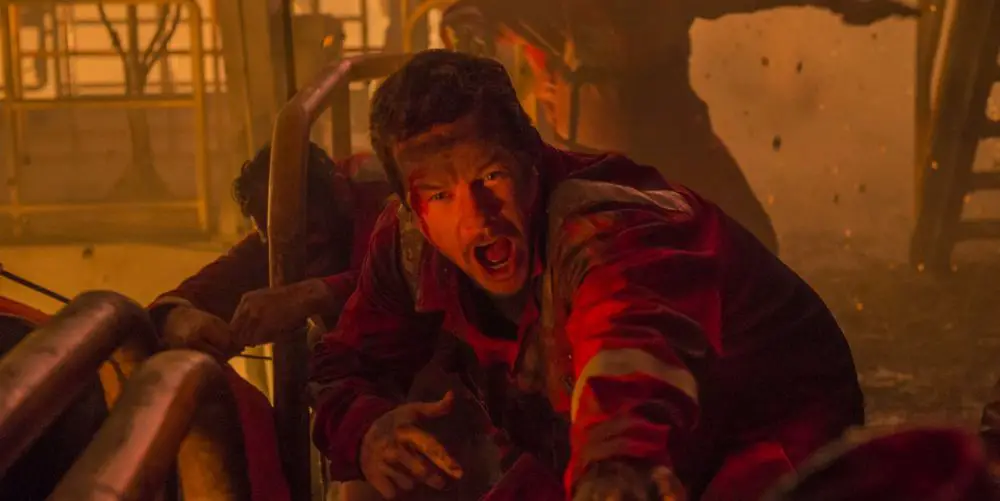DEEPWATER HORIZON: An Apolitical Environmental Blockbuster

Alistair is a 25 year old writer based in Cambridge.…
Preservation of the environment shouldn’t be a political issue, let alone a controversial one. Yet the right wing governments of the western world are frequently abandoning environmental and climate change issues, even building entire grand-standing platforms on how the entire act of climate change is a mere myth. The masses no longer trust “experts”, no matter how many facts they have on their side about the devastating realities of our changing environment.
The populist right-wing have been quick to take advantage of this, even outside of the US. In the UK, Prime Minister Theresa May quietly scrapped the British government’s environmental department within her first 24 hours on the job, in a move seen by many as to curry favour with those further to the right.
What I’m trying to say is, given the current political climate (no pun intended), it is incredibly brave of a studio to green light a $157 million disaster movie based on the worst environmental disaster in US history. Deepwater Horizon shamelessly courts mainstream audiences and never directly mentions the environmental consequences of the oil rig disaster, or the subsequent 70 day Gulf of Mexico oil spill, but it doesn’t need to. The movie bravely takes an apolitical stance, showing through imagery alone what a colossal mess the entire incident became – even pointing a finger at capitalist greed, without ever outlining it.
An Apolitical Political Movie
On the outside, Deepwater Horizon is a humanist disaster movie. On the inside, it is the most justifiably angry mega-budget movie of the year. I have no doubt that mainstream audiences on both sides of the political fence will love it. It is deftly written to be angry, without feeling political.

Which isn’t to say that director Peter Berg’s film is flawless. The movie possesses a fantastic second act, which contains some of the most grueling tension you are ever likely to see in a PG-13 movie, as the characters slowly realise their hopelessness in the midst of a natural disaster like this. When the crackerjack action isn’t unfolding, though, Deepwater Horizon is less surefooted.
As a director, Berg has always favoured Michael Bay-style action; he hasn’t always been successful (hello, Battleship!), but he usually manages to bring to the table more substance than Bay would ever allow himself. Here, he seems unsure of whether he wants to make another Bay style ripped from the headlines action extravaganza, in the same vein as 13 Hours: Secret Soldiers of Benghazi, or if the movie needs a more serious, Paul Greengrass-inspired approach to the real life source material.
Deepwater Horizon is never boring, but it is a frequently awkward clash of tones that don’t sit well together. For example, in the film’s first act, the dialogue is largely a combination of oil industry jargon (recalling the dense language you’d find in Mark Boal’s screenplays for Kathryn Bigelow), with the cheesy, awkward and entirely ill-fitting humour that has become Michael Bay’s calling card. I can’t imagine any other earnest dramas this awards season opening with Mark Wahlberg cracking premature ejaculation jokes, or the not-remotely-creepy sight of his young daughter walking in on his parents being intimate and telling them to continue, as she “really wants a younger brother”.
Patriotic, Despite Making America Look Bad
The film repeatedly goes out of its way to try and position itself as broad, due to a self-awareness that certain audiences may be sceptical about a film depicting an environmental disaster – one character even calls another a “democrat” as an insult at one point. This broadness doesn’t just extend to the comedy. The closing credits crawl, telling viewers what happened next to the characters portrayed, is soundtracked by an inexplicably ‘Murica song.

For a movie depicting the American contribution to the worst climate disaster of the decade, it is utterly bizarre to see it end with a song that seems to suggest a rallying cry for patriotism. Even weirder is that the movie before it is so bitingly, albeit quietly, cynical. It just unashamedly and unironically ends with what appears to be a nationalistic call-to-arms. In Berg’s previous movies, including the similarly real-life tale Lone Survivor, this makes complete sense. Here, it left me scratching my head more than the credits-accompanying sight of the real-life people who inspired the movie, looking nothing like the actors portraying them.
On the plus side, Berg adds plenty of fantastic Spielbergian touches to the look of the movie, to make such grueling real life drama entirely palatable as a blockbuster. An opening scene where an oil spill is mimicked with a soda can could come straight out of E.T., whilst the horrifying sight of a seagull affected by the oil spill slowly dying after landing on a boat is directed with a rare grace. It may be obvious CG used in this sequence, but it is undeniably well put together; the screenplay may be awkwardly toned, but at least his visual motifs are consistent. They work because they aren’t as overblown as they sound written down.
Although there aren’t any standout performances, the ensemble cast are largely solid. Mark Wahlberg has slowly morphed into the everyman action hero role in recent years, and delivers exactly what you’d expect of him. He is an innately likeable family man and also possesses a middle-American relatable quality that will no doubt make him feel mightily familiar to US audiences.
The whole show is stolen by Kurt Russell, as the rig’s installation supervisor. Russell doesn’t give a particularly standout performance, but he is having the time of his life taking second-billing in a major blockbuster – he chews the scenery in the most subtle way imaginable.

Also chewing the scenery, but leaving noticeable bite marks on the screen, is John Malkovich, in an awkward role that ranks amongst his career worst. As the clear villain (and personification of capitalist greed) Donald Vidrine, the senior BP employee supervising the infrastructure of the well, Malkovich settles on an inexplicable accent early on and continues to change nationalities as the movie progresses. It is rare for a big budget blockbuster to be so restrained in its acting approach – which is why Malkovich stands out all the more.
Conclusion
Deepwater Horizon may seem like forgettable blockbuster fare (and certainly will be as soon as the Oscar race comes into full swing) but it is refreshing to see a mega budget movie with something more than just mindless explosions on its mind. It shamelessly courts mainstream audiences with a stealth political agenda masquerading as humanitarianism – but if it gets blockbuster crowds to think about serious issues, as well as deliver all the popcorn action they could possibly want, then that is no bad thing.
What are the best “Based on Real Events” movies of recent years?
Deepwater Horizon is released in UK cinemas on Thursday 29th September and in US cinemas a day later. All release dates can be found here.
Does content like this matter to you?
Become a Member and support film journalism. Unlock access to all of Film Inquiry`s great articles. Join a community of like-minded readers who are passionate about cinema - get access to our private members Network, give back to independent filmmakers, and more.
Alistair is a 25 year old writer based in Cambridge. He has been writing about film since the start of 2014, and in addition to Film Inquiry, regularly contributes to Gay Essential and The Digital Fix, with additional bylines in Film Stories, the BFI and Vague Visages. Because of his work for Film Inquiry, he is a recognised member of GALECA, the Gay & Lesbian Entertainment Critics' Association.













